
Hemaris diffinis, the snowberry clearwing, is a moth of the family Sphingidae. This moth is sometimes called "hummingbird moth" or "flying lobster". This moth should not be confused with the hummingbird hawk-moth of Europe.

The hemlock moth, also known as the defoliating hemlock moth or poison hemlock moth, is a nocturnal moth species of the family Depressariidae. Of Palaearctic origin, it was first found in North America in 1973 when it was accidentally introduced. The moth is now widespread throughout the northern half of the United States, southern Canada, northern Europe, and, more recently, New Zealand and Australia. The larval form grows to around 10 mm, while the adults wingspan is between 17 mm and 19 mm.
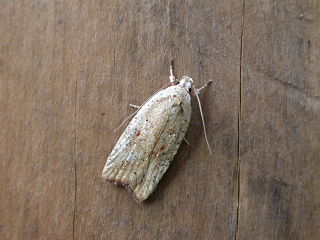
The gorse tip moth is a smallish moth species of the family Depressariidae.
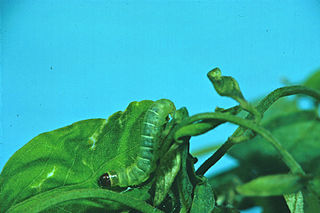
Agonopterix robiniella, the four-dotted agonopterix moth or locust leaf roller, is a moth of the family Depressariidae. It is found in North America, where it has been recorded to appear in places from Nova Scotia to Georgia, west to Oklahoma, north to Illinois, Michigan and southern Ontario.

Agonopterix is a moth genus of the superfamily Gelechioidea. It is placed in the family Depressariidae, which was often – particularly in older treatments – considered a subfamily of the Oecophoridae or included in the Elachistidae.
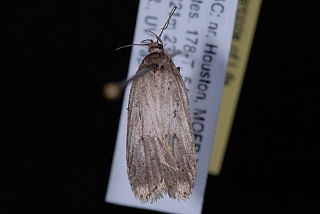
Agonopterix canadensis, the Canadian agonopterix, is a moth of the family Depressariidae. It is found from the north-eastern United States and southern Canada, south through the Rocky Mountains to Colorado, the Basin Range and the mountains of central California and Nevada.

Agonopterix curvipunctosa is a moth of the family Depressariidae. It is found in most of Europe, except Ireland, Portugal, Finland, the Baltic region and the western and southern part of the Balkan Peninsula.

Agonopterix clemensella is a moth of the family Depressariidae. It is found in eastern North America, where it has been recorded from Arkansas, Illinois, Indiana, Kentucky, Maine, Michigan, Minnesota, Mississippi, Missouri, Ohio, Oklahoma, Ontario, Pennsylvania, Tennessee, Vermont, Virginia, West Virginia and Wisconsin. The habitat consists of damp woods and meadows.
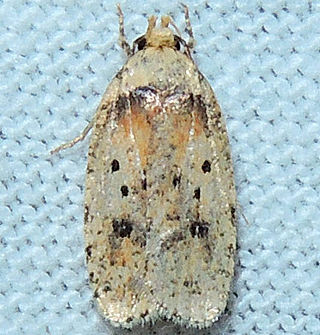
Agonopterix flavicomella is a moth of the family Depressariidae. It is found in North America, where it has been recorded from Alabama, Georgia, Illinois, Indiana, Kentucky, Maine, Michigan, Minnesota, North Carolina, Ohio, Tennessee, Virginia and West Virginia.
Agonopterix costimacula is a moth in the family Depressariidae. It was described by John Frederick Gates Clarke in 1941. The Global Lepidoptera Names Index lists it as a synonym of Agonopterix nigrinotella. It is found in North America, where it has been recorded from Maryland, Michigan, Ohio and Ontario.
Agonopterix oregonensis is a moth in the family Depressariidae. It was described by John Frederick Gates Clarke in 1941. It is found in North America, where it has been recorded from California to southern British Columbia.

Agonopterix argillacea is a moth in the family Depressariidae. It was described by Thomas de Grey in 1881. It is found in North America, where it has been recorded from California to British Columbia and in Manitoba, Ontario, New Brunswick, Nova Scotia, Michigan, South Dakota, Illinois, Texas, Florida and Utah.
Agonopterix arnicella is a moth in the family Depressariidae. It was described by Thomas de Grey, 6th Baron Walsingham, in 1881. It is found in North America, where it has been recorded from Alberta, Ontario, Washington, Oregon and California.
Agonopterix lythrella is a moth in the family Depressariidae. It was described by Thomas de Grey in 1889. It is found in North America, where it has been recorded from Illinois, Maine, Maryland, Massachusetts, Michigan, Minnesota, New Brunswick, New Hampshire, New York, North Carolina, Nova Scotia, Ohio, Ontario and Saskatchewan.
Agonopterix nigrinotella is a moth in the family Depressariidae. It was described by August Busck in 1908. It is found in North America, where it has been recorded from Arkansas, Illinois, Indiana, Maine, Maryland, Michigan, Minnesota, New York, Ohio, Ontario, Quebec and Wisconsin.
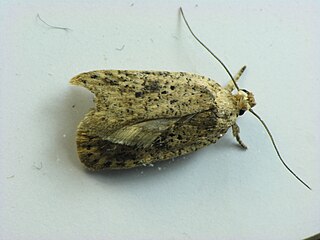
Agonopterix senicionella is a moth in the family Depressariidae. It was described by August Busck in 1902. It is found in North America, where it has been recorded from Kentucky, Michigan, Ohio, Virginia and West Virginia.
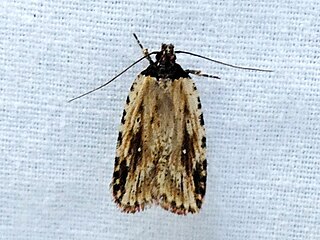
Agonopterix atrodorsella is a species of moth in the family Depressariidae. It was first described by James Brackenridge Clemens in 1863. It is found in North America, where it has been recorded from Illinois, Indiana, Kentucky, Maine, Maryland, Massachusetts, Michigan, New Brunswick, New Hampshire, New York, North Carolina, Ohio, Ontario, Quebec and Wisconsin.

Agonopterix curvilineella, the curved-line agonopterix moth, is a species of moth in the family Depressariidae. It was first described by William Beutenmüller in 1889. It is found in North America, where it has been recorded from Illinois, Indiana, Kentucky, Maine, Maryland, Massachusetts, Michigan, Minnesota, Mississippi, New Brunswick, New York, Ohio, Ontario, Quebec, Tennessee, West Virginia and Wisconsin.
Agonopterix dammersi is a moth in the family Depressariidae. It was described by Clarke in 1947. It is found in North America, where it has been recorded from southern Arizona and California.
Agonopterix eupatoriiella is a moth in the family Depressariidae. It was described by Vactor Tousey Chambers in 1878. It is found in North America, where it has been recorded from Illinois, Kentucky, Maryland, Michigan, Minnesota, Mississippi, Missouri, North Carolina, Ohio, Quebec, Tennessee and Wisconsin.













